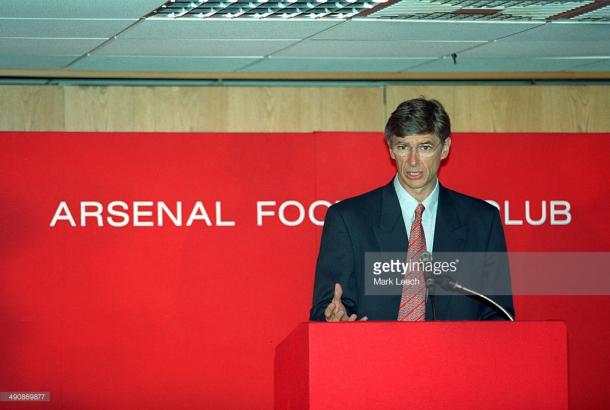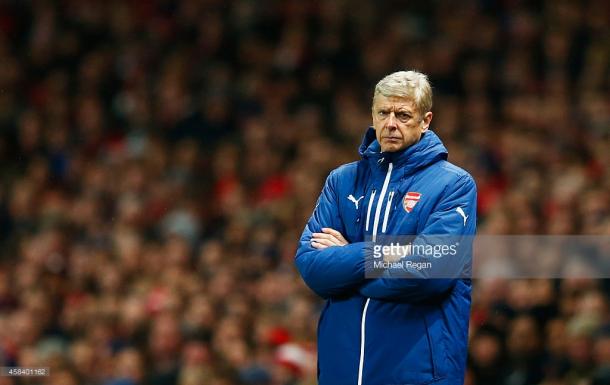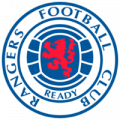Arsene Wenger arrived at Arsenal in October 1996 as a complete unknown name in English football. However, 20 years later, everyone knows the name, and his services to the game are up there with the very best managers of all time.
The last ten or so years have been tough for him and the club in terms of success, but his loyalty has been second to none, and this weekend the club celebrates two decades with the French manager in charge.
There will most likely be none like him again, so whether or not you are Wenger in or Wenger out you can't deny just how much of an impact he's had on Arsenal.
Arsene Who? The man that revolutionised English football
The headline in the papers when Wenger arrived at Arsenal was, 'Arsene Who?', and rightly so. The Frenchman, a lean figure with spectacles and a suit that almost appeared too big for him at the time, arrived in North London from Japan. His appointment was a huge surprise after the departure of Bruce Rioch, especially arriving from a club as little known as Nagoya Grampus Eight, but the decision to bring him in had a brilliant effect.
Very few however would have expected this surprise appointment to change the English game as much as it did. Wenger brought the club forward a whole new level during the late 1990s and at the start of the new millennium and it was a gamble from David Dein that paid complete dividends.
However for a man, who in the words of Ian Wright "looked more like a headmaster" Wenger would soon become the professor of football in England. The Arsenal manager would go on to lead a revolution of the sport in this country, and arguably throughout the world.
His coaching methods were like none anyone had seen in this country, basing his team around players who were intelligent and willing enough to learn. It's that particular aspect of Wenger's philosophy that has rang true throughout the majority of his spell at Arsenal. Training sessions were done in mass detail, larger than ever before. Different stretches were being done, and the benefits explained incredibly definitively.
The club and its way was undergoing huge change, Wenger brought in new diets as the food on offer to the players changed significantly. The food was all rather bland, but these new ways helped players massively, especially the older heads in the dressing room at the time like Nigel Winterburn and Steve Bould who were in the later stages of their careers. Supplements were also brought into the team, with the importance of creatine and protein especially important.

Players were told if they were missing zinc or iron in their body, and with the help of that, cramp would start to disappear and players would become less fatigued. That was also aided by the new state of the art training facilities. Just as Wenger had arrived at the club, the current training ground, which he didn't like anyway, was burnt to the ground in an 'arson' attack, the irony of that is quite something, but that gave the Frenchman another opportunity to revolutionise the club.
New specialist recovery areas were now in place, and staff hired to benefit those aspects of the players' lives. An osteopath called Philippe Boixel was introduced to the team, and his methods of rehabilitating players was first class. All of these things may seem pretty small now, but it was those aspects which have helped Arsenal become what they are today, and inspired ideas of how football was to develop right across England.
The golden years
Wenger's time at Arsenal also has to be remembered for the trophies he brought to the club, even if they are enduring somewhat of a dry spell recently when it comes to the biggest of competitions. In his first full season in charge, 1997-98, the club won the league and FA Cup double. He may have inherited a brilliant back-line but players such as Patrick Vieira, Emmanuel Petit, and Marc Overmars who he brought in were pivotal in his first few years at the club. Wenger's Arsenal was just starting to come together.
They then went on to win the league and cup double again in 2001/02, with an almost equally brilliant back-line. This time Wenger had his own additions in defence, with Ashley Cole and Sol Campbell crucial. However one name obviously stands out in attack; Thierry Henry, who under Wenger became one of the games greatest stars and helped lead the club to glory.
The club won the FA Cup again in 2002/03, but the next season, 2003/04 will be remembered as Wenger's and the club's greatest ever campaign. Arsenal went unbeaten in the league, winning the title and at the same time being named the Invincibles. It was that team which will be known as one of the best ever, and some of the names in that squad are some of the finest to grace the Premier League.
The wingers, Robert Pires and Freddie Ljungberg were exceptional, the central midfielders of Gilberto Silva and Vieira built an incredibly solid platform, whilst the back-line of Jens Lehmann, Lauren, Kolo Toure, Campbell and Cole was easily the best in the division. Also how could we have got this far without mentioning Dennis Bergkamp, who arrived under Rioch, and flourished spectacularly under the guidance of Wenger.
Troubling last decade but the last of his kind?
Over the last couple of years there have been numerous calls for Wenger to get the sack, but time and time again a new contract is laid down. Whether or not that will be the case at the end of this season remains to be seen but without a doubt he's the last of his kind, a generation of managers, including Sir Alex Ferguson, where mangers have stuck at clubs for extended periods of time.
There will probably never be another one like him, especially at Arsenal. Despite all those years of winning trophies for the club, it has been a struggle recently for Arsenal in regards to winning trophies, and rediscovering that winning mentality.
The move from Highbury to the Emirates has been talked about a lot, and the money invested into the new ground limited the club hugely financially over the last ten years. The season before they moved to their new home they lost the Champions League final and since then just two trophies have come with those two FA Cup wins in 2013/14 and 2014/15.

The present
Wenger's ideas may seem outdated now, especially if you look at the likes of Pep Guariola and what he's brought to the table. However for all the revolutionary things he brought when he first arrived in England, the French manager's inability to adapt to the growing football world has been rather strange.
It's arguable though that this season Wenger has his best crop of players in years, possibly since the days of Henry, Pires and co. The likes of Mesut Ozil and Alexis Sanchez are thriving, and the football the team have been playing of late and the speed with which they are moving the ball again, has fans having flashbacks of the Invincibles.
If this is Wenger's last campaign as Arsenal manager though, then the players will want to give him a fond farewell. A first Premier League title since 2004 would be the perfect send off, but there is plenty of work to do for Wenger this season before that becomes a reality.
There's been rumours of him taking the England job, and in some sense with all he's done for the English game, that would be a fitting way for him to end his managerial career.










































